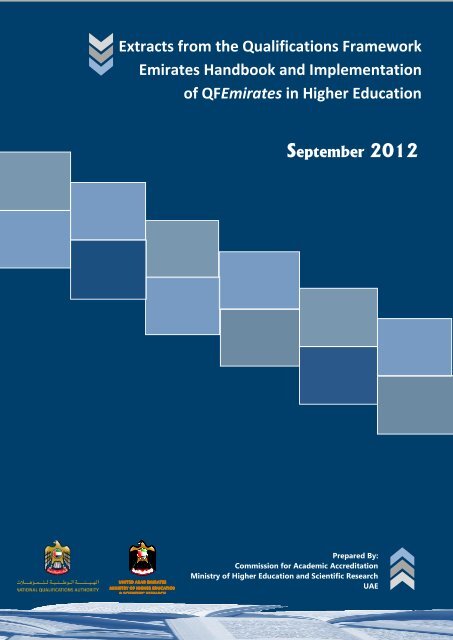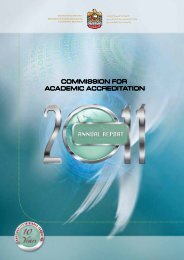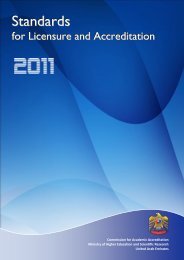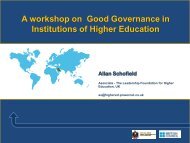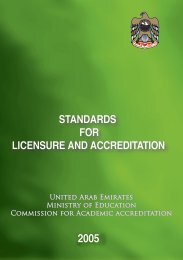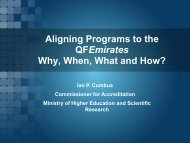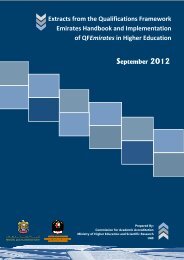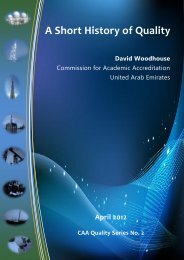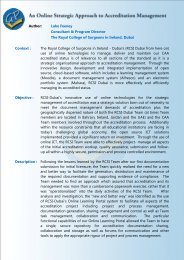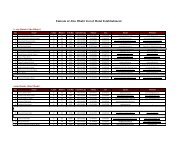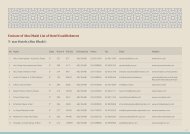Extracts from the Qualifications Framework Emirates ... - CAA
Extracts from the Qualifications Framework Emirates ... - CAA
Extracts from the Qualifications Framework Emirates ... - CAA
Create successful ePaper yourself
Turn your PDF publications into a flip-book with our unique Google optimized e-Paper software.
<strong>Extracts</strong> <strong>from</strong> <strong>the</strong> <strong>Qualifications</strong> <strong>Framework</strong><strong>Emirates</strong> Handbook and Implementationof QF<strong>Emirates</strong> in Higher EducationSeptember 2012Prepared By:Commission for Academic AccreditationMinistry of Higher Education and Scientific ResearchUAE
1 <strong>Emirates</strong> Handbook and Implementation of QF<strong>Emirates</strong> in Higher Education
FOREWORDThis brief document is based on selected extracts <strong>from</strong> <strong>the</strong> <strong>Qualifications</strong> <strong>Framework</strong><strong>Emirates</strong> Handbook published by <strong>the</strong> National <strong>Qualifications</strong> Authority (Approved 20February 2012 -1b1). The selected content is particularly relevant to <strong>the</strong> specificneeds of <strong>the</strong> Higher Education sector. The document introduces <strong>the</strong> structure andfunction of <strong>the</strong> <strong>Framework</strong>, and issues for <strong>the</strong> community of Higher Educationproviders to address in relation to Institutional Licensure and Program Accreditation.Commentary <strong>from</strong> <strong>the</strong> Commission for Academic Accreditation is inserted within <strong>the</strong>text to provide focus in relation to <strong>the</strong> needs and requirements of <strong>the</strong> HigherEducation sector.<strong>Emirates</strong> Handbook and Implementation of QF<strong>Emirates</strong> in Higher Education2
3 <strong>Emirates</strong> Handbook and Implementation of QF<strong>Emirates</strong> in Higher Education
Table of ContentsDevelopment Background ...................................................................................................... 1Scope and Purpose of <strong>the</strong> QF<strong>Emirates</strong> ................................................................................... 2Key Drivers of <strong>the</strong> QF<strong>Emirates</strong> and Related Systems ........................................................... 3Design of <strong>the</strong> QF<strong>Emirates</strong> ........................................................................................................ 4QF<strong>Emirates</strong> Levels and <strong>the</strong>ir alignment to o<strong>the</strong>r National <strong>Framework</strong>s ............................ 5Key Definitions of Terminology in <strong>the</strong> QF<strong>Emirates</strong> .............................................................. 6Structure of <strong>the</strong> <strong>Framework</strong> for <strong>Qualifications</strong> ..................................................................... 6Generic and Specific <strong>Qualifications</strong> titles .............................................................................. 7Authority to determine and issue <strong>Qualifications</strong> ................................................................ 10Satisfying <strong>the</strong> Requirements for <strong>the</strong> Issuing of <strong>Qualifications</strong> .......................................... 12Responsibility for Assessment .............................................................................................. 13Entry Requirements …………………………………………………………………………………… 18Equivalence Recognition and Attestation including Foreign <strong>Qualifications</strong>and Awards ............................................................................................................................. 16Recognition of Prior Learning (RPL) arrangements ........................................................... 18Coordination of Commissions’ Activities - Equivalences, Attestation and RPL ............... 19Implementation and Transition Arrangements .................................................................. 20Appendices.............................................................................................................................. 21Appendix A- Grid of Level Descriptors ...................................................................... 21Appendix B- Summary Level Descriptors .................................................................. 27<strong>Emirates</strong> Handbook and Implementation of QF<strong>Emirates</strong> in Higher Education4
DEVELOPMENT BACKGROUNDThe <strong>Qualifications</strong> <strong>Framework</strong> for <strong>the</strong> <strong>Emirates</strong> Handbook is <strong>the</strong> product of three years ofresearch and development work by <strong>the</strong> QF Project Team. The initial research anddevelopment work investigated <strong>the</strong> benefits of various international qualificationsframeworks in improving <strong>the</strong> skills levels, productivity and global competitiveness of nations.This work led to <strong>the</strong> issuing of a Federal Decree No. 1 ‘Establish and maintain <strong>the</strong> National<strong>Qualifications</strong> Authority’ on <strong>the</strong> 23 August 2010.The vision for <strong>the</strong> UAE in decreeing that <strong>the</strong>re will be a qualifications framework for <strong>the</strong> UAEis to develop and maintain a qualifications system that values every individual’s learning andoptimises access, transfer, progression and recognition of qualifications, leading to a skilledand knowledgeable workforce for a globally competitive environment.The <strong>Qualifications</strong> <strong>Framework</strong> for <strong>the</strong> <strong>Emirates</strong> Handbook provides detailed information about<strong>the</strong> architecture of qualifications in <strong>the</strong> UAE and also defines <strong>the</strong> requirements that willenable UAE qualifications to be compared with and valued alongside foreign qualifications.The Handbook sets out <strong>the</strong> policies, structures, standards, systems and procedures for a<strong>Qualifications</strong> <strong>Framework</strong> for <strong>the</strong> <strong>Emirates</strong>, known as <strong>the</strong> QF<strong>Emirates</strong>. It enables a coherent,consistent and robust approach to be taken to <strong>the</strong> design of qualifications for highereducation, general education and technical, vocational and professional education andtraining. It sets out criteria for both <strong>the</strong> accreditation of qualifications and for thoseorganisations in <strong>the</strong> public and private sectors which are to deliver <strong>the</strong>m. It providesguidance and a reference tool for accreditation and awarding bodies and qualificationsdesigners and developers.The term ‘General Education’ as used in <strong>the</strong> context of <strong>the</strong> <strong>Qualifications</strong> Authority,refers to High School Education and not <strong>the</strong> concept of general courses in highereducation as referred to in <strong>the</strong> <strong>CAA</strong> Standards.Perhaps most importantly, <strong>the</strong> QF<strong>Emirates</strong> is a facilitative tool that aims to promote <strong>the</strong>concept of lifelong learning as <strong>the</strong> means to enable individuals to plan and access learning inorder to fulfill <strong>the</strong>ir potential and to contribute to <strong>the</strong> future growth and prosperity of <strong>the</strong>UAE.The requirement for implementation and compliance with <strong>the</strong> QF<strong>Emirates</strong> will beacross <strong>the</strong> non-federal and federal sectors of higher education in <strong>the</strong> United Arab<strong>Emirates</strong>.1 <strong>Emirates</strong> Handbook and Implementation of QF<strong>Emirates</strong> in Higher Education
The National <strong>Qualifications</strong> Authority (NQA) Transition Steering Committee supervised <strong>the</strong>development of <strong>the</strong> Handbook, and <strong>the</strong> <strong>Qualifications</strong> <strong>Framework</strong> Technical CoordinationGroup (QFTC-Group) was responsible for its technical development. The process ofdevelopment involved many stakeholders, organisations and practitioners.The Commission for Academic Accreditation has delegated responsibility <strong>from</strong> <strong>the</strong>NQA for implementation and regulation of <strong>the</strong> QF<strong>Emirates</strong> in <strong>the</strong> context of highereducation. The <strong>CAA</strong> has been represented throughout <strong>the</strong> development process on<strong>the</strong> NQA Steering Committee, <strong>the</strong> QFTC-Group and <strong>the</strong> NQA Board of TrusteesThe NQA Board of Trustees approved <strong>the</strong> <strong>Qualifications</strong> <strong>Framework</strong> for <strong>the</strong> <strong>Emirates</strong>Handbook on <strong>the</strong> 20th February 2012. The NQA will implement <strong>the</strong> <strong>Framework</strong> incooperation with relevant entities and entrusted bodies, including <strong>the</strong> <strong>CAA</strong>.SCOPE AND PURPOSE OF THE QFEMIRATESThe QF<strong>Emirates</strong> with its ten levels has been designed to be <strong>the</strong> single structure throughwhich all qualifications in <strong>the</strong> UAE can be described and compared, enabling <strong>the</strong> relationshipbetween all qualifications to be defined.The <strong>Framework</strong> levels aim to accommodate qualifications awarded for learning achieved inschools; <strong>the</strong> workplace; <strong>the</strong> community; training centres; colleges; and universities, <strong>from</strong> <strong>the</strong>most basic to <strong>the</strong> most advanced levels of learning. Thus, <strong>the</strong> QF<strong>Emirates</strong> sets out torecognise all forms of learning, including that achieved through experiences in workplaces oro<strong>the</strong>r non-formal or informal settings.While <strong>the</strong> QF<strong>Emirates</strong> provides a frame of reference for existing qualifications, it alsoprovides <strong>the</strong> basis for <strong>the</strong> design of new types of qualifications, recognising 'learningoutcomes' defined in terms of knowledge, skills, and aspects of competence. In particular,<strong>the</strong> <strong>Framework</strong> paves <strong>the</strong> way for a new system of qualifications and awards for vocational,technical and professional education and training (known as vocational education andtraining, or VET) in <strong>the</strong> UAE.The vocational qualifications associated with programs of one year or longer arecurrently under <strong>the</strong> regulation of <strong>the</strong> <strong>CAA</strong>. Short training programs will ultimatelybe regulated by <strong>the</strong> newly constituted Vocational Education and Training AwardsCommission.The QF<strong>Emirates</strong> introduces a general understanding of <strong>the</strong> meaning of a qualification,defining it as: "a formally approved parcel of learning outcomes to standards set by <strong>the</strong><strong>Emirates</strong> Handbook and Implementation of QF<strong>Emirates</strong> in Higher Education2
elevant accreditation/awarding body, which can be achieved by a learner." This understandingdiffers <strong>from</strong> <strong>the</strong> existing common approach that a qualification is based on participation andtime-spent on a course or programme.The <strong>Framework</strong> of ten (10) levels also provides <strong>the</strong> basis for comparisons of UAEqualifications with o<strong>the</strong>r national and international qualifications. It includes alignmentsbetween qualifications systems in <strong>the</strong> UAE and <strong>the</strong> qualifications and certification systems ofo<strong>the</strong>r countries as well as between <strong>the</strong> QF<strong>Emirates</strong> and meta-frameworks such as <strong>the</strong>European <strong>Qualifications</strong> <strong>Framework</strong> (EQF), <strong>the</strong> emerging Arab <strong>Qualifications</strong> <strong>Framework</strong> and<strong>the</strong> <strong>Framework</strong> of <strong>Qualifications</strong> of <strong>the</strong> European Higher Education Area (EHEA, or 'Bologna'<strong>Framework</strong>).The key drivers underpinning <strong>the</strong> introduction of a national qualifications framework andrelated systems are as follows:KEY DRIVERS OF THE QFEMIRATES AND RELATED SYSTEMSA single frameworkAll educational institutions in <strong>the</strong> UAE will benefit <strong>from</strong> <strong>the</strong> establishment of a unified andsingular system and reference point for all national qualifications. The establishment of asingle framework will facilitate <strong>the</strong> work of <strong>the</strong> country’s decision makers in developingrelevant strategic educational and training policies and directions.A common benchmarkFormulating a single set of outcomes-based criteria and adopting common nomenclaturewill add structure and order to <strong>the</strong> current system that is comprised of a wide variety ofvaried qualifications currently offered by educational institutions in <strong>the</strong> UAE. Developing acommon language to designate levels of learning enhances communication amongeducational institutions and <strong>the</strong> communities <strong>the</strong>y serve.<strong>Qualifications</strong> flexibilityOne of <strong>the</strong> goals of <strong>the</strong> NQA in establishing <strong>the</strong> framework is to ensure that <strong>the</strong>qualifications have <strong>the</strong> flexibility to accommodate changing technologies and changingworkplace environments. (See “Common Benchmark” above.)Labour marketA focus on establishing commonly understood language to designate levels of learning canbetter enable representatives of industry, government, and educational institutions to planprograms that prepare individuals for employment in areas where <strong>the</strong>re are shortages ofskilled employees.3 <strong>Emirates</strong> Handbook and Implementation of QF<strong>Emirates</strong> in Higher Education
Quality and consistencyA well-developed framework will address <strong>the</strong> need for improved and transparentmechanisms for assuring <strong>the</strong> quality, consistency and rigour in <strong>the</strong> delivery of educationalprograms.Mobility and portabilityThe qualifications are also designed to enhance learner mobility, not only in <strong>the</strong> UAE, butinternationally by ensuring that qualifications are portable.Lifelong learningWe live in a knowledge-based society that requires all people to engage in lifelong learning.A qualifications framework will enable <strong>the</strong> government, industry, and educational institutionsto develop more transparent mechanisms for recognizing and awarding credit for bothformal and non-formal learning.The <strong>CAA</strong> is currently collaborating with <strong>the</strong> NQA in <strong>the</strong> development of draft‘Recognition of Prior Learning’ (RPL) guidelines for institutions. <strong>CAA</strong> Standardsrequire institutions seeking to award credit for prior learning to have policies andprocedures approved by <strong>the</strong> Commission (See Standards, Sections 3.1.7 and 5.6.DESIGN OF THE QFEMIRATESDesign of <strong>the</strong> QF<strong>Emirates</strong> is based on three features:1. Number of levelsEach level represents a hierarchy of relative difficulty, complexity and depth. The higher<strong>the</strong> qualifications framework level, <strong>the</strong> greater <strong>the</strong> challenge and <strong>the</strong> demand expectedof a learner in order to be awarded <strong>the</strong> relevant qualification.2. Range of learning outcomes at each level with learning outcomes beingdescribed in terms of knowledge, skill and competenceUsing learning outcomes as <strong>the</strong> common language in <strong>the</strong> design of qualificationsframeworks makes it easier for international alignments, and also enhances portabilityand mobility of individual qualification holders. Each of <strong>the</strong>se unique learning outcometerms is defined in statements of knowledge, skill and competence. They are assembledin vertical strands for each framework level. The use of strands of learning outcomes andlevels in a qualifications framework helps improve <strong>the</strong> hierarchical and distinguishingcharacteristics applicable between levels as well as within a level. It provides thosedesigning qualifications with a finely drawn vertical and horizontal structure (grid) tofacilitate easy alignment.<strong>Emirates</strong> Handbook and Implementation of QF<strong>Emirates</strong> in Higher Education4
A set of learning outcome statements for each level is called ‘Level Descriptors’. Theydistinguish <strong>the</strong> levels within a qualifications framework.Level Descriptors form <strong>the</strong> foundation for specific qualifications design and development(i.e. qualifications are developed for specific needs and aligned to <strong>the</strong> appropriate level).The QF<strong>Emirates</strong> grid comprises six levels above <strong>the</strong> point of graduation <strong>from</strong> HighSchool at Level 4 i.e. levels 5 – 10. These are <strong>the</strong> levels and associated qualificationsthat are of principal interest to higher education providers.3. A qualifications structure - classification (type), titles and profilesThe types of qualifications that are to be used in <strong>the</strong> QF<strong>Emirates</strong> are defined, as is <strong>the</strong>convention for titling qualifications at each level. More than one qualification may beestablished at <strong>the</strong> same level. Titles are assigned to each relevant qualification to beused.For each qualification an individual ‘profile’ (specification) is produced using <strong>the</strong> LevelDescriptors. Each qualification profile thus denotes <strong>the</strong> parcel of learning outcomes to beachieved for <strong>the</strong> given qualification outcome. They become <strong>the</strong> ready reference tool forqualifications development, assessment, alignment and comparability.QFEMIRATES LEVELS AND THEIR ALIGNMENT TO OTHER NATIONALFRAMEWORKSA fur<strong>the</strong>r key design consideration was <strong>the</strong> desire to ensure that <strong>the</strong> QF<strong>Emirates</strong> could beclearly and easily aligned to international meta-frameworks, in particular <strong>the</strong> European<strong>Qualifications</strong> <strong>Framework</strong> (EQF) and <strong>the</strong> <strong>Framework</strong> for <strong>Qualifications</strong> of <strong>the</strong> European HigherEducation Area (<strong>the</strong> Bologna <strong>Framework</strong>).The intended ten levels readily relate to <strong>the</strong> EQF and <strong>the</strong> Bologna <strong>Framework</strong> as well as o<strong>the</strong>rnational frameworks, such as <strong>the</strong> Australian <strong>Qualifications</strong> <strong>Framework</strong> or Ireland’s National<strong>Framework</strong> of <strong>Qualifications</strong>. The table below shows how <strong>the</strong> QF<strong>Emirates</strong> aligns to <strong>the</strong> EQFand Bologna <strong>Framework</strong>.5 <strong>Emirates</strong> Handbook and Implementation of QF<strong>Emirates</strong> in Higher Education
Alignment of QF<strong>Emirates</strong> with European <strong>Qualifications</strong> <strong>Framework</strong> and <strong>the</strong> Bologna<strong>Framework</strong>:QFEMIRATES LEVEL EQF LEVEL BOLOGNA FRAMEWORK10 8 Third cycle9, 8 7Second cycle7 6 First cycle6 5 Short cycle5 44 33 21,2 1KEY DEFINITIONS OF TERMINOLOGY IN THE QFEMIRATESIt is important to include key definitions of terminology to enhance consistency ofunderstanding and communication for developers, users and <strong>the</strong> community. Thesedefinitions have been included in Annexure B of <strong>the</strong> Handbook – Key definitions ofterminology in <strong>the</strong> QF<strong>Emirates</strong>.STRUCTURE OF THE QUALIFICATIONS FRAMEWORK FOR THEEMIRATESThe QF<strong>Emirates</strong> Level Descriptors are comprised of:1. Number of levelsTen [10] levels have been adopted for <strong>the</strong> QF<strong>Emirates</strong>.2. Learning Outcomes (5 strands)Learning outcomes expressed in terms of strands:KnowledgeSkillAspects of competence (comprising three strands).<strong>Emirates</strong> Handbook and Implementation of QF<strong>Emirates</strong> in Higher Education6
3. Definition of <strong>the</strong> five strandsThese five [5] strands of learning outcomes reflect what is expected to be achieved at<strong>the</strong> respective level, for each qualification. A qualification is defined, benchmarked andaligned to <strong>the</strong> requisite level.The 10 levels encompass <strong>the</strong> widest possible spread of learning: Level 1 can recognize<strong>the</strong> ability to perform practical and elementary tasks, while Level 10 qualificationsrecognise <strong>the</strong> ability to discover and develop new knowledge and skills required at <strong>the</strong>frontiers of research and scholarship.The 10 levels and five ‘strands’ of learning outcome statements (defined for each level -totalling fifty [50] statements), form a grid of Level Descriptors. See Annexure C in <strong>the</strong>Handbook and Appendix A in this document– Grid of Level Descriptors.The five strands of learning outcomes comprise knowledge, skill, and aspects ofcompetence in terms of:autonomy and responsibilityrole in contextself-development.Strands of learning outcomesSTRAND 1 STRAND 2 STRAND 3 STRAND 4 STRAND 5LEVEL XKnowledgeSkillAutonomyandresponsibilityRole incontextSelf-developmentAspects of CompetenceGENERIC AND SPECIFIC QUALIFICATIONS TITLESWith <strong>the</strong> establishment of a qualifications structure, <strong>the</strong> ‘generic’ title of <strong>the</strong> qualificationsthat will be used at each level and <strong>the</strong> ‘specific’ titling (sector activities, discipline, field oflearning/work, or subject matter/topic area) beyond <strong>the</strong> generic can be determined. A7 <strong>Emirates</strong> Handbook and Implementation of QF<strong>Emirates</strong> in Higher Education
specific title is one that amplifies and gives content context to <strong>the</strong> generic title. It sets out <strong>the</strong>required learning outcomes relevant to sector activities, discipline, field of learning/work, orsubject matter/topic area. For example, a Bachelor qualification is to be developed forbusiness administration: <strong>the</strong> Degree, ‘Bachelor’ is a ’generic’ title used for a Level 7qualification in <strong>the</strong> QF<strong>Emirates</strong>. The specific sector activities, field of learning/work ordiscipline relates to Business Administration. Thus, <strong>the</strong> qualification title comprised of <strong>the</strong>generic title is amplified by <strong>the</strong> specific title and represented in <strong>the</strong> following manner:Bachelor of Business Administration (showing both ‘generic’ title and ‘specific’ title).The qualifications structure of <strong>the</strong> QF<strong>Emirates</strong> is primarily concerned with control of <strong>the</strong>‘generic’ title. Consequently, <strong>the</strong> titles and respective profiles of ‘generic’ qualifications areused as <strong>the</strong> basic building block for developing <strong>the</strong> ‘specific’ qualifications. Genericqualifications cannot be developed for achievement by a learner seeking such.The ‘specific’ qualification titles relate to content and context and are, <strong>the</strong>refore, much moredetailed and focused than those defining ‘generic’ qualification titles and profiles. Moreover,‘specific’ qualifications when developed against <strong>the</strong> defined titles and profiles and approvedby <strong>the</strong> relevant accreditation/awarding body are considered to be directly aligned to <strong>the</strong>QF<strong>Emirates</strong>.It should be noted that while it is possible to design qualifications that fit exactly to <strong>the</strong>qualification profiles of a level, <strong>the</strong> reality in practice is that most qualifications are made<strong>from</strong> parcels of learning outcomes defined in <strong>the</strong> standards that may relate to more than onelevel. Never<strong>the</strong>less, it is possible to identify <strong>the</strong> dominant level in any bundle of outcomesand so ascribe a level designation to any qualification.Often <strong>the</strong>se qualifications are managed, developed, approved and/or recognised by <strong>the</strong>relevant authorised bodies such as accreditation/awarding bodies (or commissions) includingfederal and o<strong>the</strong>r entities with <strong>the</strong> power to award qualifications, such as universities. Thesework in consultation with competent advisory arrangements/committees <strong>the</strong>y haveestablished to provide advice on such.An initial generic set of qualification titles and profiles have been developed for use in <strong>the</strong>QF<strong>Emirates</strong>.The transition <strong>from</strong> existing to new titles, where necessary to align with <strong>the</strong>QF<strong>Emirates</strong>, will be accomplished over a reasonable time frame to bediscussed with <strong>CAA</strong> licensed institutions.<strong>Emirates</strong> Handbook and Implementation of QF<strong>Emirates</strong> in Higher Education8
Principal <strong>Qualifications</strong> ‘generic’ titlesThe adopted titles for all Principal <strong>Qualifications</strong> by education sector are detailed asfollows:Principal <strong>Qualifications</strong> TitlesLevel10GenericNomenclaturePrincipal Qualification titles used in <strong>the</strong> QF<strong>Emirates</strong>(each with its own profile)VocationalEducation andTraining (VET)Higher Education(HE)General Education(G12-GE)Doctoral Degree - Doctoral-9Master Degree Applied Master Master -8Graduate DiplomaApplied GraduateDiplomaPostgraduateDiploma-76Bachelor Degree Applied Bachelor Bachelor -Diploma Advanced Diploma Higher Diploma -5 Diploma / AssociateDegreeDiplomaAssociate Degree-4Certificate Certificate 4 -Secondary SchoolCertificate (G 12)321Certificate Certificate 3 - TBACertificate Certificate 2 - -Certificate Certificate 1 - -The ‘specific’ qualifications are supplemented by a common and unique coding system toimprove national education and training information management. The approved codingsystem is used for recording <strong>the</strong> outcomes on a formal national register, to be known as <strong>the</strong><strong>Qualifications</strong> Register and Information System (QRIS). This is discussed in more detail inSection 4.5. of <strong>the</strong> QF<strong>Emirates</strong> Handbook.9 <strong>Emirates</strong> Handbook and Implementation of QF<strong>Emirates</strong> in Higher Education
Accreditation/awarding bodies manage <strong>the</strong> ‘specific’ qualifications that are developedagainst <strong>the</strong> QF<strong>Emirates</strong> qualifications profiles which require recognition within <strong>the</strong>ir remit.Given <strong>the</strong>y are directly developed against a government authorised, publicly declared andavailable benchmark in <strong>the</strong> QF<strong>Emirates</strong>, this enhances and builds widespread confidence andunderstanding in <strong>the</strong>ir usability, applicability and currency. This approach is explained inmore detail by way of examples of <strong>the</strong> titling conventions covering ‘generic’ and ‘specific’Principal <strong>Qualifications</strong>, Composite Awards and Component Awards 1 that could bedeveloped against <strong>the</strong> list of adopted qualification titles. Also included are respectivemanagement responsibilities that apply in terms of <strong>the</strong> QF<strong>Emirates</strong> ‘generic’ and ‘specific’qualifications and awards.AUTHORITY TO DETERMINE AND ISSUE QUALIFICATIONSThe National <strong>Qualifications</strong> Authority (NQA) has overall responsibility to set policy, manageand assure <strong>the</strong> quality and integrity of <strong>the</strong> qualifications system implemented under itsauspices. Three accreditation/awarding bodies have been recognised as operational bodiesor commissions. These bodies are responsible for <strong>the</strong> approval of qualifications, standards,accreditation of programs and courses, assessment and quality assurance within <strong>the</strong>ir remit.Additionally, <strong>the</strong>y are responsible for managing and issuing (directly or indirectly bydelegation) qualifications against <strong>the</strong> QF<strong>Emirates</strong> specific to <strong>the</strong>ir area of operation. Theseare:Commission for Academic Accreditation (<strong>CAA</strong>)General Education Commission for Secondary Education (GEC)Vocational Education and Training Awards Commission (VETAC) (underdevelopment).Higher Education SectorWith respect to <strong>the</strong> Higher Education sector, responsibility rests with <strong>the</strong> Commission forAcademic Accreditation (<strong>CAA</strong>) of <strong>the</strong> Ministry of Higher Education and Scientific Research. Inthis sector, institutions such as universities and colleges set <strong>the</strong> objectives and academicrequirements of requisite programs toge<strong>the</strong>r with entry requirements, often with respect to<strong>the</strong> requirements of professional bodies. Having met such, a program must be submitted andmeet <strong>the</strong> Commission’s Licensure and Accreditation Standards.1 Composite Awards and Component Awards are <strong>the</strong> working titles of qualifications at a given level that have asmaller volume of learning than Principal qualifications. Normally, <strong>the</strong>y form a constituent part of a Principalqualification, so are important in encouraging progression and lifelong learning<strong>Emirates</strong> Handbook and Implementation of QF<strong>Emirates</strong> in Higher Education10
The Commission for Academic Accreditation of <strong>the</strong> Ministry of Higher Education andScientific Research is responsible for <strong>the</strong> licensure of institutions and academicprograms, which are of one academic year or longer. Upon being licensed andaccredited for requisite programs, relevant universities and colleges have authority toissue relevant qualifications. The <strong>CAA</strong> has responsibility for such programs at levels 5-10 in <strong>the</strong> QF<strong>Emirates</strong>.Typically, institutions establish program advisory committees that capture <strong>the</strong> requirementsof relevant professional bodies and business groups. These comprise a range of interestedstakeholders including practitioners, employer representatives, community representativesand academic staff <strong>from</strong> o<strong>the</strong>r institutions to facilitate continuous improvement of contentand relevance.The <strong>CAA</strong> Standards (2011), Section 11.2 refers to <strong>the</strong> requirement thatinstitutions of higher education establish Advisory Groups and/or o<strong>the</strong>rmodes of engagement and ongoing dialogue with employers.Coordination of <strong>the</strong> respective CommissionsWhilst <strong>the</strong> NQA recognises <strong>the</strong> independence of each commission to undertake activitiesconsistent with <strong>the</strong>ir remit, <strong>the</strong>re is an acknowledged underlying level of interdependence.This interdependence needs nurturing and coordination within <strong>the</strong> context of <strong>the</strong> integratedQF<strong>Emirates</strong>. Opportunities for access, transfer and progression can be significantly enhancedthrough joint efforts, commitment and cooperative actions between <strong>the</strong> Commissions.Moreover, greater clarity and information can be developed and presented to those seekingnew careers, new opportunities and/or pathways to lifelong learning.Under its remit for strategic coordination, <strong>the</strong> NQA is establishing a group charged with <strong>the</strong>responsibility of:identifying, promoting, enhancing and facilitating opportunities and arrangementsfor cross-sector access, transfer and progression by undertaking joint exercises,projects and/or activities that explore and provide recommendationsassuring protection of <strong>the</strong> ‘generic’ qualification titles and qualifications profilescontained in <strong>the</strong> QF<strong>Emirates</strong>undertaking joint exercises, projects and/or activities that explore and providerecommendations to enhance synergies in education and training informationsystems, data retrieval, access and reporting11 <strong>Emirates</strong> Handbook and Implementation of QF<strong>Emirates</strong> in Higher Education
developing first level responses to enquiries <strong>from</strong> respective commissions or relatedbodies affecting two or more sectorsdiscussing issues and identifying options for matters in common that would improve<strong>the</strong> quality of outcomes of education and training and <strong>the</strong>ir relationship with <strong>the</strong>labour market in respective sectors, including, but not limited to, performance andreview of quality assurance processes, career education and advice, assessment,CoreLife Skills, RPL, equivalence arrangements, and qualification outcomes toemployment relevance.sharing experiences, and identifying possible solutions to issues arising <strong>from</strong> <strong>the</strong>implementation of <strong>the</strong> QF<strong>Emirates</strong> in respective sectorsmaking recommendations and/or suggestions in relation to improvements to, ordevelopment of new, policy formulation or supporting guidelines to <strong>the</strong> NQA Boardof Trusteesaddressing o<strong>the</strong>r such matters that can assist in <strong>the</strong> implementation, promotion,understanding and commitment to <strong>the</strong> QF<strong>Emirates</strong>.SATISFYING THE REQUIREMENTS FOR THE ISSUING OFQUALIFICATIONSThe three accreditation/awarding bodies (commissions) recognised by <strong>the</strong> National<strong>Qualifications</strong> Authority customarily deploy or recognise differing assessment techniquesand methodologies to give effect to <strong>the</strong> process of issuing qualifications under <strong>the</strong>ir remit.Each supports a quality assurance process that ensures that <strong>the</strong> assessment processes meet<strong>the</strong> principles of impartiality, validity, reliability and consistency.The National <strong>Qualifications</strong> Authority will recognise existing arrangements and willcoordinate and work with <strong>the</strong> commissions to ensure continuous improvement processes arein place and maintained such that <strong>the</strong> quality of outcomes of assessment are consistentlyenhanced and assured.“Typically, <strong>the</strong> decision to issue a qualification relies on a judgement(s) being made<strong>from</strong> evidence presented and/or produced <strong>from</strong> recognised quality assured assessmentprocesses. The purpose of assessment under <strong>the</strong> QF<strong>Emirates</strong>, for which a qualificationmay be issued as an affirmation of achievement, is to determine if learning to <strong>the</strong>standard defined in respective learning outcomes has been achieved”.<strong>Emirates</strong> Handbook and Implementation of QF<strong>Emirates</strong> in Higher Education12
<strong>CAA</strong> licensed institutions are required under its 2011 Standards (Section 2.1.1)to ensure that it has “a well designed system of institutional research, whichprovides <strong>the</strong> institution with <strong>the</strong> capability to determine whe<strong>the</strong>r <strong>the</strong>objectives of its academic, student, and administrative service units, and <strong>the</strong>learning outcomes of its academic programs and courses, are being met”.To assure <strong>the</strong> overall quality of <strong>the</strong> system and in accordance with <strong>the</strong> Decree under which itwas established, <strong>the</strong> National <strong>Qualifications</strong> Authority will conduct periodic strategicevaluations of <strong>the</strong> quality of performance of those who authorise or endorse qualificationsand those responsible for <strong>the</strong> assessment and issuing of qualifications against respectivedefined and approved quality assurance measures. The outcomes of <strong>the</strong> evaluationprocesses are used to provide feedback and more importantly to assist in identifyingstrategic action agendas for system and sector improvements.RESPONSIBILITY FOR ASSESSMENTHigher Education sectorAn institution licensed by <strong>the</strong> Commission for Academic Accreditation (<strong>CAA</strong>) of <strong>the</strong> Ministryof Higher Education and Scientific Research, and approved to issue <strong>the</strong> requisitequalification(s), is fully responsible for <strong>the</strong> assessment process as well as <strong>the</strong> decision toaward. Additionally, where relevant, this institution is also responsible for <strong>the</strong> provision andmaintenance of records of achievement. In performing this activity., it is also responsible forensuring <strong>the</strong> quality of <strong>the</strong> assessment techniques, methodologies and processes deployedto meet <strong>the</strong> Commission’s requirements.The issuing of qualificationsWithin <strong>the</strong> QF<strong>Emirates</strong>, three qualification types are used: ‘Principal’ Qualification,‘Composite’ Award, and ‘Component’ Award. Respective accreditation/awarding bodies(commissions) may use <strong>the</strong> qualification types to meet <strong>the</strong> needs of <strong>the</strong>ir respectiveconstituencies and to ensure alignment and consistency with <strong>the</strong> QF<strong>Emirates</strong>.Each qualification will reflect <strong>the</strong> relevant learning outcomes for a given level of <strong>the</strong>QF<strong>Emirates</strong> and respective qualification profile that must be achieved to permit its issuance.For qualification purposes, accreditation/awarding bodies or <strong>the</strong>ir appointed qualificationsdevelopers assemble learning outcomes into coherent parcels (topics, subjects, skills,standards) representative of <strong>the</strong> sector and aligned to <strong>the</strong> relevant QF<strong>Emirates</strong> qualificationprofile.13 <strong>Emirates</strong> Handbook and Implementation of QF<strong>Emirates</strong> in Higher Education
The institution will issue <strong>the</strong> qualification according to its own processes andprocedures as approved by <strong>the</strong> <strong>CAA</strong>– since <strong>the</strong> <strong>CAA</strong> has accredited <strong>the</strong>programs, based on <strong>the</strong> QF<strong>Emirates</strong>, it should automatically follow that it willmeet <strong>the</strong> requirements of <strong>the</strong> National <strong>Qualifications</strong> Authority.The qualification, including <strong>the</strong> transcript, is formally issued by <strong>the</strong> relevant awarding body orits delegated agent (e.g. licensed education and training provider) to an individual who hasachieved <strong>the</strong> specified learning outcomes and within <strong>the</strong> relevant commissions or <strong>the</strong>delegated agency’s publicly declared validity period, as advised. An individual who has notachieved <strong>the</strong> full requirements of <strong>the</strong> relevant qualification is provided with a transcript of<strong>the</strong> achievements obtained at that point in time. This too, is formally issued within areasonable time period, specified by <strong>the</strong> awarding organization.A body that issues a qualification, inclusive of any partially completed relevant training andassessment, is responsible for providing and maintaining all records associated with it and<strong>the</strong> respective individual. It is a requirement that administration and management of suchinformation, inclusive of any confidentially requirements, is in accord with that establishedand publicly advised in respective licensure and quality assurance systems by respectivecommissions or delegated bodies.Protecting qualification titlesThe NQA warrants <strong>the</strong> protection of <strong>the</strong> qualification nomenclature ‘generic’ titles andqualifications profiles contained and used in <strong>the</strong> QF<strong>Emirates</strong> to respectiveaccreditation/awarding bodies; in this instance <strong>the</strong> three commissions recognised by <strong>the</strong>NQA. The commissions and <strong>the</strong>ir respective delegated agencies (including licensededucation and training providers), where appropriate, are charged with <strong>the</strong> responsibility ofmonitoring and assuring <strong>the</strong> protection of all titles, and ‘specific’ qualifications developed,approved and/or issued under <strong>the</strong>ir authority. Policy coordination is led by <strong>the</strong> NQA.The NQA, in coordination with <strong>the</strong> commissions frequently appraise <strong>the</strong> market to ensure<strong>the</strong>re are no organisations, bodies or agencies replicating in anyway <strong>the</strong> development,approval or issuance of similar qualifications, or purporting to represent, pass-off or act onbehalf of a commission or <strong>the</strong> National <strong>Qualifications</strong> Authority without specific licensureapproval <strong>from</strong> <strong>the</strong>m. Where breaches are detected, relevant commissions must address<strong>the</strong>se in <strong>the</strong> first instance in accordance with <strong>the</strong>ir policies and procedures. Whereappropriate and where additional support is needed, <strong>the</strong>y will be assisted by <strong>the</strong> National<strong>Qualifications</strong> Authority. Action will be in accordance with <strong>the</strong> relevant and prevailing lawunder which <strong>the</strong> National <strong>Qualifications</strong> Authority operates, and any supplementaryarrangements including policies and procedures so enunciated by <strong>the</strong> NQA.<strong>Emirates</strong> Handbook and Implementation of QF<strong>Emirates</strong> in Higher Education14
The format of qualifications and transcriptsAs explained in <strong>the</strong> Handbook, three qualification types are issued in <strong>the</strong> QF<strong>Emirates</strong>:‘Principal’ Qualification, ‘Composite’ Award and ‘Component’ Award. The three commissionsuse <strong>the</strong>se types of qualifications to meet <strong>the</strong>ir specific needs. Prospects and opportunitiesmay arise <strong>from</strong> time to time to improve sectoral synergies in terms of transfer of learningand of reporting. This may include enhancing <strong>the</strong> consistency of reporting formats across <strong>the</strong>sectors with respect to <strong>the</strong> appearance of qualifications and <strong>the</strong> inclusion of minimumrelevant information on <strong>the</strong> qualification record and transcript. In due course, <strong>the</strong> NQA andrespective commissions may proceed to work towards and apply a uniform qualificationrecord and transcript reporting arrangement across <strong>the</strong> sectors; however this is subject toongoing systems collaboration and transitions period.The <strong>CAA</strong> and NQA are currently working toge<strong>the</strong>r to develop appropriateguidelines for records of student achievement and transcripts on VETprograms of less than one year in duration and for higher educationprograms.ENTRY REQUIREMENTSQualification entry requirements vary according to sector, qualification type and level.Higher Education sectorThe NQA recognises that <strong>the</strong> Commission for Academic Accreditation (<strong>CAA</strong>) manages <strong>the</strong>formal entry criteria requirements for <strong>the</strong> Higher Education sector, encompassed in <strong>the</strong><strong>CAA</strong>’s Licensure and Accreditation Standards (2011), which are revised periodically inaccordance with its continuous improvement processes. Typically, entry to courses/programsin this sector requires students to have attained <strong>the</strong> General Education Secondary SchoolCertificate or approved equivalent level upon entry.The minimum admissions criteria required for entry into undergraduate andgraduate programs are detailed in Sections 5.2 and 5.3 of <strong>the</strong> 2011 Standards forLicensure and Accreditation. This includes <strong>the</strong> requirement for <strong>CAA</strong> approvedEnglish language test scores in relation to programs delivered in English.Bachelor Degree entryLearners on entry typically hold a General Education Secondary School Certificate (G 12) orits equivalent, including any approved special provisions for entry or bridging or foundationprograms. Learners may sometimes also enter <strong>from</strong> a recognised Higher Diploma or15 <strong>Emirates</strong> Handbook and Implementation of QF<strong>Emirates</strong> in Higher Education
Diploma/Associate Degree as transfer students. O<strong>the</strong>r post-secondary qualifications may beconsidered appropriate to attain entry into Bachelor Degree programs.Postgraduate Diploma entryEntry to Postgraduate Diplomas is typically based on evidence of a capacity to undertakehigher studies in a proposed field. It requires an appropriate Bachelor Degree, with aspecified threshold for <strong>the</strong> GPA score, but o<strong>the</strong>r post Bachelor qualifications may also berecognised as appropriate entry requirements.Master Degree entryEntry to Master Degrees is typically based on evidence of a capacity to undertake higherdegree studies in a proposed field. There is a wide range of entry pathways which will varyaccording to <strong>the</strong> program methodology and <strong>the</strong> discipline involved. Predominantly researchbasedprograms normally have a research pre-requisite whereas predominantly course workbased programs may be accessed more broadly. The normal entry requirement is anappropriate Bachelor Degree, with a specified threshold for <strong>the</strong> GPA score, but o<strong>the</strong>r post-Bachelor qualifications may also be recognised as appropriate entry requirements.Doctoral Degree entryEntry to Doctoral Degrees is typically based on evidence of a capacity to undertake work thatcontributes to <strong>the</strong> creation and interpretation of new knowledge through original research tosatisfy peer review, and extend <strong>the</strong> forefront of knowledge in <strong>the</strong> discipline. Typically, entryto a Doctoral program requires a Master Degree that incorporates a period of research oro<strong>the</strong>r appropriate qualifications post Master Degree.EQUIVALENCE RECOGNITION AND ATTESTATION INCLUDINGFOREIGN QUALIFICATIONS AND AWARDSThe demand for declarations of equivalence of foreign qualifications and awards is a normwithin mature qualification based systems. The UAE is a major receiver of foreign issuedqualifications and awards. This applies to:nationals that may have successfully completed a qualification or award in ano<strong>the</strong>rcountry, or in-country (UAE), orexpatriates that are engaged in employment in <strong>the</strong> UAE.To this end, In particular, it applies to all higher education qualifications including AssociateDegree (formally Diploma) and Higher Diploma 2 . This is carried out by <strong>the</strong> Certificate2 all at levels 5-10 in <strong>the</strong> QF<strong>Emirates</strong> of one year or more in duration<strong>Emirates</strong> Handbook and Implementation of QF<strong>Emirates</strong> in Higher Education16
Equivalency Department (CED) of <strong>the</strong> Ministry of Higher Education and Scientific Research(MoHESR). It represents <strong>the</strong> ‘gate’ through which all academic qualifications enter <strong>the</strong> UAE.There is also a formal process in place for General (compulsory) Education, which is managedby <strong>the</strong> Ministry of Education (MoE). In terms of <strong>the</strong> VET sector, <strong>the</strong>re was no formal structureor processes in place to confer equivalence, mutual recognition declarations and/or attestingof qualifications. This is being addressed with <strong>the</strong> establishment of <strong>the</strong> Vocational Educationand Training Awards Commission (VETAC).Higher Education Sector- <strong>the</strong> CEDThe CED assumes a significant role as it gives students/learners relevant information aboutinstitutes <strong>the</strong>y plan to join in terms of recognition, <strong>the</strong> specialisations <strong>the</strong>y offer and <strong>the</strong>academic system applied for in achieving equivalence of <strong>the</strong> degree or certificate. All thisinformation is prepared by CED and is made available to students to approach <strong>the</strong> respectiveinstitutes. CED’s primary aims are to:verify <strong>the</strong> au<strong>the</strong>nticity of qualifications issued by higher education institutions outside<strong>the</strong> UAE and brought into <strong>the</strong> UAEensure that <strong>the</strong>se qualifications satisfy <strong>the</strong> academic criteria applicable in <strong>the</strong> UAEassess <strong>the</strong>m against <strong>the</strong> UAE academic standards“The recognition of foreign qualifications is critical to <strong>the</strong> orderly function of <strong>the</strong>community, employment and economy in <strong>the</strong> UAE. The UAE has a range of establishedformal declaration processes that cover equivalence and/or attesting qualifications”.assess qualifications issued by approved higher education private institutes inside <strong>the</strong>UAEupgrade <strong>the</strong> outputs of higher education within <strong>the</strong> UAE.The CED provides <strong>the</strong> following services:1. Equivalency:1.1 To ensure <strong>the</strong> equivalency of qualifications issued by approved institutions ofhigher education outside <strong>the</strong> UAE.1.2 To deal with enquiries about <strong>the</strong> approved institutions of higher education ando<strong>the</strong>r academic systems.2. Attestations:2.1 To attest qualifications and documents issued by approved private highereducation institutions inside <strong>the</strong> UAE.CED’s Equivalency Committee’s mandate does not cover:vocational certificates that do not include formal academic studytraining course certificates17 <strong>Emirates</strong> Handbook and Implementation of QF<strong>Emirates</strong> in Higher Education
high school certificates or lower level certificatesdocuments and certificates if <strong>the</strong>y are an integral part of an academic or vocationaldegree.RECOGNITION OF PRIOR LEARNING (RPL) ARRANGEMENTSThe principle of lifelong learning is well recognised internationally. A major <strong>the</strong>me that hasemerged is <strong>the</strong> need to give greater attention to addressing recognition processes related toan individual’s prior learning, particularly informal and non-formal learning. For definition of<strong>the</strong>se terms, see Annexure B - Key definitions of terminology in <strong>the</strong> Handbook.Recognition of Prior Learning (RPL) is typically defined as a systematic practical process thatassesses and recognises all learning; in o<strong>the</strong>r words, an individual’s knowledge, skills andcompetence, regardless of where or how <strong>the</strong> learning was acquired. Hence, RPL involves <strong>the</strong>comparison of <strong>the</strong> previous learning and experience of an individual learner howsoeverobtained against <strong>the</strong> learning outcomes required for a specified qualification. This definitionmakes clear a number of principles in <strong>the</strong> development and execution of RPL:Learning occurs in all kinds of situations - formally, informally and non-formallyMeasurement of <strong>the</strong> learning takes place against specific learning outcomes (i.e.standards) required for a specific qualificationCredits may be awarded (subject to recognition and approval of respectivecommissions) for such learning if <strong>the</strong> learning meets <strong>the</strong> requirements of <strong>the</strong>qualification.The process of recognising prior learning is about:identifying what <strong>the</strong> candidate knows and can domatching <strong>the</strong> candidate’s skills, knowledge and experience to specific standards and<strong>the</strong> associated performance criteria of a qualificationassessing <strong>the</strong> candidate against those standardscrediting (credentialing) <strong>the</strong> candidate for skills, knowledge and experience built upthrough formal, informal and non-formal learning that have occurred.The NQA recognises <strong>the</strong> importance of articulating and fur<strong>the</strong>ring <strong>the</strong> key objectives relevantto RPL. This includes facilitating access to programs, and mobility and progression withineducation, training and within and across career pathways.Fur<strong>the</strong>rmore, <strong>the</strong> NQA will pursue an approach to promote <strong>the</strong> explicit implementation ofpolicy and practices that address <strong>the</strong> possible barriers to learning and assessment amongst<strong>the</strong> respective commissions covering <strong>the</strong> Higher Education, General Education andVocational Education and Training sectors. To this end, <strong>the</strong> commissions have each<strong>Emirates</strong> Handbook and Implementation of QF<strong>Emirates</strong> in Higher Education18
ecognised <strong>the</strong> need to develop policies and procedures in relation to <strong>the</strong> implementationand use of RPL arrangements.Education and training providers in all sectors seeking to be licensed or renewing licensurewill be, in due course, required to develop and maintain explicit RPL policies anddemonstrate <strong>the</strong> application of related mechanisms as part of <strong>the</strong> licensure and qualityassurance systems applying to <strong>the</strong>m. In streng<strong>the</strong>ning <strong>the</strong>ir focus on monitoring <strong>the</strong>application of RPL arrangements as part of <strong>the</strong>ir quality assurance processes, <strong>the</strong>commissions will actively contribute to enabling <strong>the</strong> removal of perceived or real barriersassociated with <strong>the</strong> implementation of RPL.Notwithstanding <strong>the</strong> above, <strong>the</strong> NQA has a keen interest in monitoring <strong>the</strong> effectiveness andcredibility of <strong>the</strong> RPL policies and quality assurance mechanisms implemented and managedby <strong>the</strong> commissions and those administered by licensed education and training providers.The NQA in this regard undertakes periodic evaluations of <strong>the</strong> effectiveness of such policiesby respective bodies. Its findings are shared with respective bodies, and recommendedactivities initiated and coordinated through a process of continuous improvement that leadsto improvements in <strong>the</strong> use, quality and integrity of RPL outcomes.“A national policy to advance <strong>the</strong> implementation of RPL is being developed across allsectors of education and training. This policy will meet <strong>the</strong> needs of all stakeholders,including employers, licensed education and training providers (LETPs), qualityassurance bodies and most importantly, <strong>the</strong> main beneficiaries of <strong>the</strong> process, <strong>the</strong>individual learners”.COORDINATION OF COMMISSIONS’ ACTIVITIES - EQUIVALENCES,ATTESTATION AND RPLGiven <strong>the</strong> range of common and often overlapping issues that pervade <strong>the</strong> management andadministration of equivalences, attestation and RPL between higher education, generaleducation and vocational education and training, <strong>the</strong> NQA manages <strong>the</strong> coordination of <strong>the</strong>respective commissions to facilitate dialogue, consistency and to enhance pathways andopportunities between and across <strong>the</strong> sectors. It facilitates and promotes joint activities,monitors progress and reports to <strong>the</strong> NQA Board of trustees on <strong>the</strong> benefits, issues andoutcomes associated with equivalence, attestation and RPL.19 <strong>Emirates</strong> Handbook and Implementation of QF<strong>Emirates</strong> in Higher Education
IMPLEMENTATION AND TRANSITION ARRANGEMENTSThe NQA Board noted in its endorsement of <strong>the</strong> QF<strong>Emirates</strong> that full implementation of <strong>the</strong>QF<strong>Emirates</strong> would take some time. The Board recognises transition <strong>from</strong> existing educationand training arrangements would vary between respective sectors. In relation to <strong>the</strong> highereducation sector, <strong>the</strong> following would occur:Higher EducationThe Commission for Academic Accreditation (<strong>CAA</strong>) released new Standards for Licensure andAccreditation for higher education institutions in September 2011. These Standards includereference to MoHESR Licensed institutions being required to use, and refer to <strong>the</strong>QF<strong>Emirates</strong> in <strong>the</strong>ir courses/program development and promotional arrangements andactivities. Institutions would be required to increasingly implement <strong>the</strong> use of learningoutcomes consistent with those detailed in <strong>the</strong> QF<strong>Emirates</strong> for respective qualifications.Learners in existing <strong>CAA</strong> accredited programs/courses are expected to continue to complete<strong>the</strong>ir studies without change. However, all new programs and courses submitted for <strong>CAA</strong>accreditation will be required to reference <strong>the</strong> QF<strong>Emirates</strong> in <strong>the</strong> accreditation reviewprocess, ultimately leading to full implementation of <strong>the</strong> QF<strong>Emirates</strong> for all programs andcourses, within three to five years. In order for programs and <strong>the</strong>ir graduates to berecognized by <strong>the</strong> Federal authority in <strong>the</strong> UAE, i.e. <strong>the</strong> Ministry of Higher Education andScientific Research (MoHESR), each program that is offered by a MoHESR-licensedinstitution will have to demonstrate that its program outcomes are aligned to <strong>the</strong> relevantlevel descriptors in QF<strong>Emirates</strong>.<strong>Emirates</strong> Handbook and Implementation of QF<strong>Emirates</strong> in Higher Education20
APPENDICESAPPENDIX A- GRID OF LEVEL DESCRIPTORSLevel Descriptors are sets of learning outcomes statements that define levels in a frameworkof qualifications. This grid sets out descriptor statements for a framework of ten (10) levelsfor <strong>the</strong> UAE. The statements are set out in five ‘strands’, building to a grid of fifty [50]statements. The five strands comprise one each describing knowledge and skill and threedescribing aspects of competence (autonomy and responsibility, role in context, and selfdevelopment).These Level Descriptors form <strong>the</strong> foundation for <strong>the</strong> QF<strong>Emirates</strong>.Note on reading Level Descriptors:The descriptor statements defining any particular level should be read concurrentlyacross all five strands of learning outcomes to affirm a level.The Level Descriptors are cumulative e.g. <strong>the</strong> descriptor for Level 5 assumes <strong>the</strong>inclusion of all of <strong>the</strong> outcomes in <strong>the</strong> preceding levels.Level Knowledge Skill Aspects of CompetenceAutonomy andresponsibilityRole in contextSelf-development10comprehensive, deepand overarchingknowledge at <strong>the</strong>frontier of aprofessional field ofwork or discipline andat <strong>the</strong> interfacebetween different fieldsor disciplinesnew knowledge, asjudged by independentexperts applyinginternational standards,created throughresearch or scholarship,that contributes to <strong>the</strong>development of a fieldof work or disciplinea range of mastered skillsand techniques, includingsyn<strong>the</strong>sis, evaluation,planning and reflection,required to extend andredefine existingknowledge orprofessional practice orto produce originalknowledgeadvanced skills indevelopinginnovative solutions tocritical problems inresearch using highlydeveloped cognitive andcreative expert skills andintellectualindependencehighly developed expertcommunication andinformation technologyskills to present, explainand/or critique highlycomplex and diversematters to specialistacademic, peerspecialists/expertsand/or professionalaudiencescan act withsubstantial authority,creativity, autonomy,independence,scholarly andprofessional integrityin a sustainedcommitment to <strong>the</strong>development of newideas or processes orsystems inchallenging andnovel work orlearning contextscan account foroverall governance ofprocesses andsystems can leadaction to build andtransform socioculturalnorms andrelationshipscan originate andmanage complexprofessionalprocessescan lead and takefull responsibilityfor <strong>the</strong>development andstrategicdeployment ofprofessionalteams and selfcan initiate anddeploy qualitiesassociated withprofessionalleadership of peergroups and teamscan analyse andcritique <strong>the</strong> stateof learning in aspecialised field andcontribute to itsadvancementcan self-evaluate andlead contributions toprofessionalknowledge, ethicsand practiceincluding inunfamiliar andunpredictablelearning contextscan consistently andsensitivelymanage highlycomplex and diverseethical issues leadingto informed, fairand valid judgements21 <strong>Emirates</strong> Handbook and Implementation of QF<strong>Emirates</strong> in Higher Education
Level Knowledge Skill Aspects of CompetenceAutonomy andresponsibilityRole in contextSelf-development9comprehensive, highlyspecialized knowledgein a field of work,discipline and/orprofessional practice,and at <strong>the</strong> interfacebetween differentfields, includingfrontier concepts andrecent developmentsadvanced knowledgeof applicable researchprinciples andmethodscritical awareness ofknowledge issues, as<strong>the</strong> basis for originalthinking;encompassingappropriate processesof enquiry and currentprocesses ofknowledge productiondetailed body ofknowledge of recentdevelopments in afield of work, and/ordisciplineadvanced skills requiredin research, analysis,evaluation and/orinnovation of complexideas, information,concepts and/oractivitiesskills to develop newknowledge andprocedures and tointegrate knowledge<strong>from</strong> different fieldsusing highly developedcognitive and creativeskills and intellectualindependence to <strong>the</strong>field of work or disciplineadvanced problemsolvingskills to analysehighly complex issueswith incomplete data anddevelop innovativesolutions and proposalsrelevant to an academic/professional field, field ofwork or disciplineplanning skills to developand execute a majorproject or comparableactivities (that includes asignificant range ofvariables and complexity)with appropriatelyselected researchmethodologies producingsound conclusionscan functionautonomously and/or take responsibilityfor managingprofessionalpractices, work,processes orsystems, or learningcontexts that arehighly complex,unpredictable andunfamiliar, andrequire new strategicapproaches and/orintervention orconceptual abstractsolutionscan account for highlevel governance ofprocesses andsystemscan analyse andreflect on socioculturalnorms andrelationshipsand act to build andtransform <strong>the</strong>mcan initiate andmanageprofessionalactivities thatmay include ahighly complexenvironmentcan takeresponsibility forleading <strong>the</strong>strategicperformance anddevelopment ofprofessionalteams and selfcan self-evaluate andtake responsibilityfor contributing toprofessionalknowledge andpractice includingunfamiliar learningcontextscan develop andimplement fur<strong>the</strong>rlearning consistentlyand sensitivelycan consistently andsensitively managehighly complexethical issuesleading to informed,fair and validdecisionshighly developedspecialist communicationand informationtechnology skills topresent, explain and/orcritique highly complexmatters<strong>Emirates</strong> Handbook and Implementation of QF<strong>Emirates</strong> in Higher Education22
Level Knowledge Skill Aspects of CompetenceAutonomy andresponsibilityRole in contextSelf-development8advanced specialisedknowledge and criticalunderstanding in aspecialised field ofwork or discipline andat <strong>the</strong> interfacebetween fieldscomprehensiveunderstanding ofcritical approaches tocreating a systematicand coherent body ofknowledge andconcepts gained<strong>from</strong> a range ofsourcescomprehensiveknowledge ofcurrent research andinnovations in a fieldof work, discipline orprofessional practiceand impact of <strong>the</strong>sedevelopments onaccepted <strong>the</strong>ory andpracticeproblem-solving skillsapplied to a specialistfield and <strong>the</strong> integrationof knowledge <strong>from</strong>different fields of work ordisciplines to solvecomplex unpredictableand/or abstract problemswith intellectualindependenceidentify appropriatesources of information oranalytical techniques ininvestigations that leadto conclusions andsolutions to problemscritical selection ofappropriate researchinstruments andstrategies associatedwith <strong>the</strong> field of work ordisciplinehighly developedadvancedcommunication andinformation technologyskills to present, explainand/or critiquesubstantively complexmatterscan takeresponsibility fordesigning anddeveloping creativeapproaches tomanaging andevaluating complexwork processes andorganisation,resources orlearning, includingleading andmanaging teamswithin a technical orprofessional activityor workingeffectively as anindividualcan express acomprehensive,internalised,personal world view,while acceptingresponsibilityto society at largeand to socioculturalnorms andrelationshipscan manageprofessionalactivity that maybe in a complexenvironmentcan takeresponsibility forleading <strong>the</strong>strategicperformance ofprofessionalteams and selfcan coordinatepeer relationshipswith qualifiedpractitioners andlead multiple,complex groupscan initiate andsupport <strong>the</strong>management ofprofessionaldevelopmentmentoringactivitiescan self-evaluate andtake responsibilityfor contributing toprofessional practicein complex andsometimesunfamiliar learningcontextscan self-evaluate andtake responsibilityfor maintaining andenhancing currencyin <strong>the</strong> professionor disciplinecan lead, contributeand implementethical standards23 <strong>Emirates</strong> Handbook and Implementation of QF<strong>Emirates</strong> in Higher Education
Level Knowledge Skill Aspects of CompetenceAutonomy andresponsibilityRole in contextSelf-development7specialised factual and<strong>the</strong>oretical knowledgeand an understandingof <strong>the</strong> boundaries in afield of work ordiscipline,encompassinga broad and coherentbody of knowledgeand concepts, withsubstantive depth in<strong>the</strong> underlyingprinciples and<strong>the</strong>oretical conceptsan understanding ofallied knowledge and<strong>the</strong>ories in relatedfields of work ordisciplines and in <strong>the</strong>case of professionaldisciplines includingrelated regulations,standards, codes,conventionsunderstanding ofcritical approach to<strong>the</strong> creation andcompilation of asystematic andcoherent body ofknowledge andconcepts gained<strong>from</strong> a range ofsourcesa comprehensiveunderstanding ofcritical analysis,research systemsand methods andevaluative problemsolvingtechniquestechnical, creative andanalytical skillsappropriate to solvingspecialised problemsusing evidentiary andprocedural basedprocesses in predictableand new contexts thatinclude devising andsustaining argumentsassociated with a field ofwork or disciplineevaluating, selecting andapplying appropriatemethods, proceduresor techniques inprocesses ofinvestigation towardsidentified solutionsevaluating andimplementingappropriate researchtools and strategiesassociated with <strong>the</strong> fieldof work or disciplinehighly developedadvancedcommunication andinformation technologyskills to present, explainand/or critique complexand unpredictablematterscan takeresponsibility fordevelopinginnovative andadvancedapproaches toevaluating andmanaging complexand unpredictablework procedures andprocesses, resourcesor learningcan managetechnical,supervisory or designprocesses inunpredictable,unfamiliar andvarying contextscan work creativelyand/or effectively asan individual, in teamleadership, managingcontexts, acrosstechnical orprofessionalactivitiescan express aninternalised,personal view, andaccept responsibilityto society at largeand to socio-culturalnorms andrelationshipscan function withfull autonomy intechnical andsupervisorycontexts andadopt paraprofessionalroleswith littleguidancecan takeresponsibility for<strong>the</strong> setting andachievement ofgroup or individualoutcomes and for<strong>the</strong> managementand supervision of<strong>the</strong> work of o<strong>the</strong>rsor self in <strong>the</strong> caseof a specialisationin field of work ordisciplinecan participate inpeer relationshipswith qualifiedpractitioners andlead multiple,complex groupscan takeresponsibility formanaging <strong>the</strong>professionaldevelopment anddirect mentoringof individuals andgroupscan self-evaluate andtake responsibilityfor contributing toprofessional practice,and undertakeregular professionaldevelopment and/or fur<strong>the</strong>r learningcan manage learningcan manage learningtasks independentlyand professionally, incomplex andsometimesunfamiliarlearning contextscan contribute to andobserve ethicalstandardfamiliarity withsources of currentand new research andknowledge withintegration ofconcepts <strong>from</strong> outsidefields<strong>Emirates</strong> Handbook and Implementation of QF<strong>Emirates</strong> in Higher Education24
Knowledge Skill Aspects of CompetenceLevelAutonomy andresponsibilityRole in contextSelf-development6specialised factualknowledge and anunderstanding of <strong>the</strong>boundaries in a field ofwork or discipline,encompassing a broadand coherent body ofknowledge and concepts,with depth in <strong>the</strong>underlying understandingof <strong>the</strong> principles andconceptsan understanding of alliedknowledge and <strong>the</strong>ories inrelated fields of work ordisciplines and in <strong>the</strong> caseof para-professionalrespective disciplineincluding relatedregulations, standards,codes, conventionsan understanding ofcritical approach andanalysis, researchapproaches and methodsand analytical problemsolvingtechniques <strong>from</strong> arange of sourcesfamiliarity with sources ofcurrent and existingknowledge and <strong>the</strong>integration of concepts<strong>from</strong> related fieldsliteracy to comprehendand/or produce coherenttexts, covering complexand/or diverse relations<strong>from</strong> a wide-range ofinformationnumeracy covering awide-range ofma<strong>the</strong>matical proceduresand representations usedacross a broad-range ofcontextsspecialist technical,creative and conceptualskills appropriate tosolving complex problemsassociated with a field ofwork or disciplinea comprehensive range ofspecialist cognitive andpractical skills appropriateto planning andimplementing solutions tovaried, unpredictable andunfamiliar problemswithin a field of work ordisciplineselection and use ofappropriate research toolsand strategiesassociated with <strong>the</strong> fieldof work or disciplineadvanced communicationand informationtechnology skills topresent, explain and/orcritique interdependentcomplex mattersliteracy skills tocomprehend and/or produce, <strong>from</strong> a widerangeof information,coherent texts coveringcomplex and/or diverserelationsnumeracy skills to select,apply, assess andcommunicate a widerange of ma<strong>the</strong>maticalprocedures andrepresentations in abroad-range of contextscan takeresponsibility fordevelopingappropriateapproaches tomanaging complexwork proceduresand processes,resources orlearning, includingleading teamswithin a technicalor professionalactivity with littlesupportcan supervisetechnical,supervisory ordesign processesin varied,unpredictable,unfamiliar and abroad-range ofcontextscan workeffectively as aspecialist or inteam leadershiprolescan express aninternalised,personal worldview, reflectingengagement insociety at largeand in socioculturalrelationshipscan function withfull autonomy intechnical andsupervisorycontexts andadopt paraprofessionalrolesunder guidancecan takeresponsibility for<strong>the</strong> setting andachievement ofgroup outcomesand for <strong>the</strong>supervision of <strong>the</strong>work of o<strong>the</strong>rscan takeresponsibility forsupervising <strong>the</strong>development ofindividuals andgroupscan participate inpeer relationshipswith qualifiedpractitioners andlead multiplegroupscan evaluate ownlearning andidentifylearningweaknesses andneeds, in afamiliar andunfamiliarenvironmentcan take initiativeto addresslearningneeds andfunctionindependently andwithin learninggroupscan support andobserve ethicalstandards25 <strong>Emirates</strong> Handbook and Implementation of QF<strong>Emirates</strong> in Higher Education
Level Knowledge Skill Aspects of CompetenceAutonomy andresponsibilityRole in contextSelf-development5comprehensive,specialisedknowledge within abroad field of work ordiscipline, including anunderstanding of <strong>the</strong>underlying <strong>the</strong>oreticaland abstract conceptswith significant depth insome areasa broad understandingof allied knowledge and<strong>the</strong>ories in related fieldsof work or disciplinesincluding relatedregulations, standards,codes, conventions andproceduresan understanding ofinformation assembly,retrieval methods andlogical problem-solvingtechniques <strong>from</strong> arange of sourcesrecognition of sourcesof current knowledgeand <strong>the</strong> integration ofconcepts <strong>from</strong> relatedfields literacy tocomprehend and/orproduce coherent textscovering complexrelations <strong>from</strong> an arrayof information andcontextsnumeracy covering anarray of ma<strong>the</strong>maticalprocedures andrepresentations andcontextstechnical, creative andconceptual skillsappropriate to solvinga wide-range of problemsassociated with a field ofwork or discipline thatinclude a comprehensiverange of specialistcognitive and practicalskills appropriate todiagnosing andimplementing solutionsto abstract, familiar andnon-routine problemswithin a field of work ordisciplineuse of appropriateinformation retrievalmethods and tools andtechniques associatedwith <strong>the</strong> field of work ordisciplinecomprehensivecommunication andinformation technologyskills to present, explainand/or critique complexmatters literacy skills tocomprehend and/orproduce, <strong>from</strong> array ofinformation, coherenttexts covering complexrelationsnumeracy skills to select,apply, reflect andcommunicate an arrayof ma<strong>the</strong>maticalprocedures andrepresentations andcontextscan takeresponsibility forcoordinating <strong>the</strong>implementationof appropriateapproaches tocomplex workprocedures andprocesses,resources orlearning, includingleading teamswithin a technicalor para-professionalactivitycan exercisecoordination and/or supervision inroutine, familiarand some nonroutinework orlearning contextscan coordinatetechnical, designprocesses inroutine, familiar,nonroutine and anarray of contextswith supportavailable, ifrequiredcan express aninternalised,personal worldview, in <strong>the</strong> contextof an understandingof socio-culturalrelationshipscan function withautonomy intechnical andcoordinationcontexts andsupportparaprofessionalroles underguidancecan function bothindependentlyand in acoordination rolewith multiplegroupscan takeresponsibility forcoordinating <strong>the</strong>development ofindividuals andgroupscan review anddevelop <strong>the</strong>performance ofself and o<strong>the</strong>rscan evaluate ownlearning andidentify learningneeds in a familiarenvironmentcan takeresponsibility for andplan own learningwithin a managedand non-routineenvironmentcan comprehend andobserve ethicalstandards<strong>Emirates</strong> Handbook and Implementation of QF<strong>Emirates</strong> in Higher Education26
APPENDIX B- SUMMARY LEVEL DESCRIPTORSThese brief Summary Level Descriptors (SLDs) are indicative and are provided as a support to<strong>the</strong> interpretation of <strong>the</strong> overall meaning of <strong>the</strong> level.Note:They are not definitive of <strong>the</strong> levels and should not be used for referencing.LevelSummary Level DescriptorsLearning outcomes at Level 10 indicate a systematic mastery of a highly specialisedfield of knowledge that is comprehensive, deep and overarching and at <strong>the</strong> frontier ofa professional field of work or discipline, with <strong>the</strong> capacity for critical analysis,evaluation and syn<strong>the</strong>sis ofnew and complex ideas. It also includes:10conceptualising, designing, implementing and adapting substantial researchprocesses using highly developed cognitive and creative expert skills andintellectual independenceleadership experience and expertise in <strong>the</strong> development of new and creativeapproaches that extend or redefine existing knowledge or professional practice,encompassing responding with substantial authority and autonomy to <strong>the</strong>development of new ideas or processes or systems in challenging and novel workor learning contextsaccounting for overall governance of processes and systemsanalysing and critiquing <strong>the</strong> state of learning in a specialised field and contributeto its advancementself-evaluating and leading contributions to professional knowledge, ethics andpractice including in unfamiliar and unpredictable learning contextsleading and managing complex professional processesconsistently and sensitively managing highly complex and diverse ethical issuesleading to informed, fair and valid judgements.27 <strong>Emirates</strong> Handbook and Implementation of QF<strong>Emirates</strong> in Higher Education
LevelSummary Level DescriptorsLearning outcomes at Level 9 indicate self-directed, comprehensive, highly specialisedknowledge and practical learning, some of which is at <strong>the</strong> forefront of knowledge in aspecialised field that provides a basis for originality and advanced knowledge andskills in research, analysis, evaluation and/or innovation encompassing complex ideas,information, concepts and/or activities and developing and/or applying ideas, oftenwithin a research context. It also includes:advanced problem-solving skills<strong>the</strong> integration of and formulation of judgements9taking account of social and ethical issues and responsibilities and reflectingexperience of managing change in a highly complex, unpredictable and unfamiliarcontext that requires new strategic approaches and/or intervention or conceptualabstract solutionsplanning skills to develop and execute a major project/activity outcome withappropriately selected research methodologies to produce sound conclusionspresenting, explaining and/or critiquing highly complex mattersmanaging professional activities in such contextself-evaluating and taking responsibility for contributing to professionalknowledge and practice including unfamiliar learning contextsdeveloping and implementing fur<strong>the</strong>r learning consistently and sensitivelyconsistently and sensitively managing highly complex ethical issues leading toinformed, fair and valid decisions.<strong>Emirates</strong> Handbook and Implementation of QF<strong>Emirates</strong> in Higher Education28
LevelSummary Level DescriptorsLearning outcomes at Level 8 indicate advanced specialised knowledge and criticalunderstanding in a specialised field of work or discipline and at <strong>the</strong> interface betweenfields as well as a comprehensive understanding of critical approaches to creating asystematic and coherent body of knowledge and concepts gained <strong>from</strong> a range ofsources. It also covers:acquiring comprehensive knowledge of current research and innovations in a fieldof work, discipline or professional practicespecialist field and integration of knowledge <strong>from</strong> different fields of work ordisciplines8skills in solving complex unpredictable and/or abstract problems with intellectualindependence and making judgements that take into account social or ethicalissuesskills to adopt a professional approach to operating in a complex environmentincluding <strong>the</strong> design and development of creative approaches to <strong>the</strong>management of complex work processes and organisation, resources or learningleading and managing teams within a technical or professional activity or workingeffectively as an individualleading <strong>the</strong> strategic performance of professional teams and selfpresenting, explaining and/or critiquing substantively complex matterstaking responsibility for contributing to professional practice in complex andsometimes unfamiliar learning contextsleading, contributing and implementing ethical standards.29 <strong>Emirates</strong> Handbook and Implementation of QF<strong>Emirates</strong> in Higher Education
LevelSummary Level DescriptorsLearning outcomes at Level 7 indicate knowledge and critical understanding of <strong>the</strong>well-established principles and practice in a field of work or discipline and isspecialised factual and <strong>the</strong>oretical. It includes an understanding of <strong>the</strong> boundaries in afield of work or discipline, encompassing a broad and coherent body of knowledgeand concepts, with substantive depth in <strong>the</strong> underlying principles and <strong>the</strong>oreticalconcepts. It also covers:allied knowledge and <strong>the</strong>ories in related fields of work or disciplines and in <strong>the</strong>case of professional respective disciplineusing methods of enquiry, critically analysis and selection of different approachesto solving problems7an understanding of <strong>the</strong> limits of <strong>the</strong> knowledge and skill acquiredtechnical, creative and analytical skills to solve specialised problems usingevidentiary and procedural based processes in predictable and new contexts thatinclude devising and sustaining arguments associated with a field of work ordisciplineevaluating and implementing appropriate research tools and strategiesevaluating and managing complex and unpredictable work procedures andprocesses, resources or learningmanaging technical, supervisory or design processes in unpredictable, unfamiliarand varying contextspresenting, explaining and/or critiquing complex and unpredictable mattersself-evaluating and responsibility for contributing to professional practiceundertaking regular professional developmentcontributing to and observing ethical standards.<strong>Emirates</strong> Handbook and Implementation of QF<strong>Emirates</strong> in Higher Education30
LevelSummary Level DescriptorsLearning outcomes at Level 6 indicate specialised factual knowledge and anunderstanding of <strong>the</strong> boundaries in a field of work or discipline and an understandingof allied knowledge and <strong>the</strong>ories in related fields of work or disciplines. In <strong>the</strong> case of<strong>the</strong> para-professional respectivediscipline, it also covers:applying specialist technical, creative and conceptual skills in planning anddeveloping strategic solutions to varied, unpredictable and unfamiliar problems,be <strong>the</strong>y abstract and/or concreteusing appropriate research tools and strategies6managing with autonomy complex work procedures and processes, resources orlearning, including leading or supervising teams within a technical or professionalactivity with little support and adopting, and where appropriate, para-professionalroles under guidancepresenting, explaining and/or critiquing interdependent complex mattersproducing <strong>from</strong> a wide-range of information, coherent texts covering complexand/or diverse relationsselecting, applying, assessing and communicating a wide-range ma<strong>the</strong>maticalprocedures and representations in a broad-range of contextsdrawing on experience of operational interaction in work or learning includingsupervision of people and projectsaddressing own learning needs and function independently and within learninggroupssupporting and observing ethical standards.31 <strong>Emirates</strong> Handbook and Implementation of QF<strong>Emirates</strong> in Higher Education
LevelSummary Level DescriptorsLearning outcomes at Level 5 indicate knowledge is comprehensive and specialisedwithin a field of work or discipline and encompasses <strong>the</strong> underlying <strong>the</strong>oretical andabstract concepts with significant depth in some areas as well as a broadunderstanding of allied knowledge and<strong>the</strong>ories. It also covers:5technical, creative and conceptual skills appropriate to solving a wide-range ofproblems including diagnosing and implementing solutions to abstract, familiarand non-routine problems within a field of work or discipline and usingappropriate information retrieval methods, tools and techniques independentlywith autonomysupervising o<strong>the</strong>rs or coordinating subordinates and peer groupssupporting para-professional roles under guidancepresenting, explaining and/or critiquing complex mattersproducing <strong>from</strong> information, coherent texts covering complex relationsapplying, reflecting and communicating an array of ma<strong>the</strong>matical procedures andrepresentations and contextsself-direction in learning and have experience of practice in both common andexceptional situationscomprehending and observing ethical standards.<strong>Emirates</strong> Handbook and Implementation of QF<strong>Emirates</strong> in Higher Education32
33 <strong>Emirates</strong> Handbook and Implementation of QF<strong>Emirates</strong> in Higher Education


